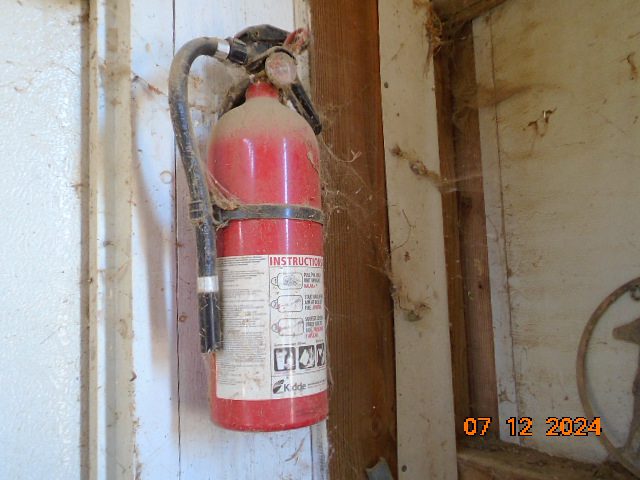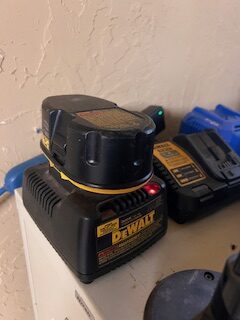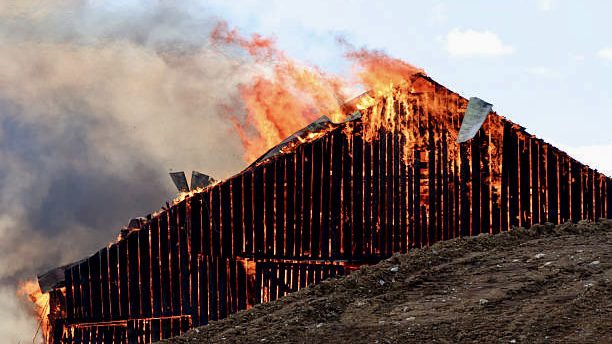It’s every horse owner’s worst nightmare: barn fires. And it is a nightmare that seems to be increasing in frequency across the industry.
While statistics of equine barn fires and losses in the United States are not regularly compiled or accessible, The National Fire Protection Association (NFPA) estimated that, during the period from 2013 – 2017, 326 deadly barn fires occurred. These fires resulted in one civilian death, ten civilian injuries, and $28 million in direct property damage annually. It is estimated that roughly 200 horses die in barn fires annually in the United States – although that may be a low number, depending on insurance reporting.
According to a compilation by Rutgers University, insurance statistics indicate that the two most common times of the year for barn fires are summer and winter.
They found that summer fires are often the result of electrical storms or spontaneous combustion of hot hay. On the other hand, winter fires are usually caused by appliances, rodents chewing through wires, or the accumulation of dust and cobwebs on electrical surfaces. Heating equipment is one of the leading causes of fires in barns, and portable heaters are the most common.
We spoke with Northwest Insurance, LLC agent Penny Young to get her tips on living your dream while avoiding the barn fire nightmare.
Store Accelerants Properly
Accelerants are substances that increase the speed at which a fire spreads. All accelerants are highly flammable or combustible, but not all highly flammable or combustible materials are considered accelerants. Common farm accelerants include, but are not limited to, gasoline, kerosene, oil, aerosol cans, paint thinner, and charcoal lighter fluid.
Accelerants must be stored in approved containers and properly labeled as such. Young recommends storing accelerants in a shed away from the barn where animals are kept, if possible. This way, in the unfortunate event of a fire, it is unlikely the fire would spread as quickly, allowing emergency personnel or barn staff a greater chance of putting the fire out with less damage.
Be Aware of and Monitor Ignition Sources
An ignition source can cause an accelerant or flammable material to ignite or smolder. Examples of ignition sources include but are not limited to, cigarettes and matches, sparks from machinery (trucks, tractors, and mowers), heaters, electrical appliances, fan motors, electrical fixtures and wires, batteries, etc.
It is essential to be aware of likely ignition sources so that they can be monitored. Ensure all cigarettes and matches are adequately extinguished, all machinery is functioning properly, heat lamps or portable heaters are not left unattended, and electrical wiring is in proper working condition (not stripped or damaged by rodents).

Maintain Fire Extinguishers
Young recommends that all barns have working fire extinguishers throughout the barn.
She emphasizes, “The key word is ‘working!’ Fire extinguishers last 5 to 15 years, depending on the brand. They have a label with an expiration date – ensure you have extinguishers that haven’t expired.”
Young advises installing extinguishers in an easy-to-reach place and ensuring everyone knows where they are.
She laments, “Many times, I have seen old fire extinguishers covered with spider webs and dust and are expired. Or they are in a random place that no one could find in an emergency, which defeats the purpose of having them.”
If you have extinguishers throughout the barn that are easy to find and in good working order, you may be able to stop a fire before it becomes a significant problem.
 Be Mindful of Battery Chargers
Be Mindful of Battery Chargers
Young also recommends that people keep an eye on battery chargers.
“Nowadays, many tools are battery-powered. Unfortunately, if the battery is left on the charger for too long, it can heat up and start a fire.”
Be mindful of cell phones and laptops, which can become very hot while charging and could ignite flammable materials around them.
“Golf carts should not be left on the charger for days. They should be charged and unplugged until the battery is low. The charger itself should also be unplugged when not in use.”

Keep Fans Clean
According to Young, electrical fans are the number one cause of equine barn fires. Specifically, the motor becomes dust-filled, and the electrical wiring can spark, igniting a fire.
Therefore, “It is important to clean fans often and check the cords for heat. If the cord is damaged, it can easily start a fire. Make sure the outlets are clean and have no burn marks. Also, fans shouldn’t be plugged into extension cords.”
Young advises that barn owners and managers check the fans and motors as a routine part of regular cleaning to ensure they are free of dust and cobwebs.
Smoke Detectors
Working smoke detectors are critical to fire prevention. However, unlike in the home environment, humans often do not live in the barn and cannot hear a detector going off if it is in a separate building.
Therefore, Young recommends that barn owners install smoke detectors that alert cell phones when they go off. “This way, if you are out of the barn, you have a warning and can either get to the barn to see what is happening or call emergency personnel.”
This system will require access to Wi-Fi for your barn to work, but it can be very effective for ensuring a faster response to fires.
Store Hay and Shavings Separately
Barn fires burn quickly because plenty of easily combustible materials can soon turn a small fire into an inferno. While not technically considered accelerants, materials like hay and shavings certainly contribute to the severity of fires.
Therefore, Young recommends storing shavings and hay in a shed separate from the stalling area whenever possible. Again, while moving them back and forth requires more work, it can significantly reduce the risk that a barn fire will become a total loss.
Fire Suppression System
Another way to help reduce the risk of equine deaths from a fire is to install a fire suppression sprinkler system. These systems are more common in newer builds, but renovations make adding them to older barns possible.
While these systems risk water damage, they can be lifesaving for horses by preventing deaths due to smoke inhalation or flames.
Other Considerations
Hiring a fire safety inspector to inspect your facility and recommend changes that reduce your fire risk may be helpful when in doubt.
National Fire Protection Association code 150, Category 2 contains fire protection measures to help safeguard horses and their housing structures. In 2019, these “standards” were upgraded to codes and must be followed for new structures and any structures making additions post-code.
Finally, it is critical to ensure that ingress and egress routes to your facility are maintained and accessible by emergency personnel and their vehicles.
Additional Information
For additional information about preventing barn fires and ensuring you have an adequate policy to cover such tragedies, you may contact Penny Young directly at Northwest Insurance, LLC. Her email is [email protected], and she can be called at 1-800-828-0279.








